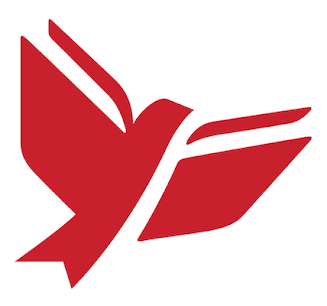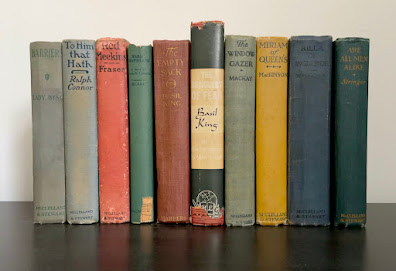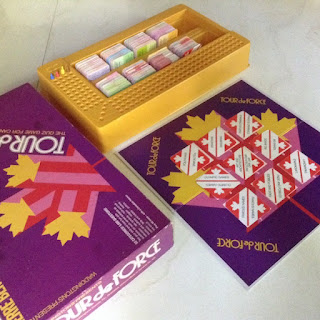My first Abebooks transaction took place in 1997, roughly two years after the site launched. I purchased a copy of Mordecai Richler's Stick Your Neck Out, Simon & Schuster's first American edition of the novel we Canadians know as The Incomparable Atuk.
Whatever you think of the two titles, there's no denying that the Canadian cover, credited to Len Deighton – yes, Len Deighton – is superior.
My second find was a very nice first edition of George Gissing's Eve's Ransom. If memory serves, it set me back all of eight quid.
There were very real bargains to be had in Abebooks' early days, and it pleased me to think that the company was Canadian.
Abebooks is no longer Canadian. In 2008, it was sold to Amazon. I still use it, though less with each passing year. Bargains are now few and far between. The company does its best to encourage, emailing daily lists like '30 essential mystery authors,' 50 essential non-fiction books,' and 'World's most valuable children's books,' which presents '10 books that commend high prices.'
Last week, I received this:
The graphic caught my eye because all of the authors are still very much with us. The titles featured were published within the last thirty years.
The text struck the usual notes: "range of voices," "unique history," "multicultural identity," "indigenous storytelling," and "narratives of everyday life," reaching a crescendo with: "Canadian literature is as diverse as the people who call it home."
"From the North to the lively cities" was something original, and the reference to "bilingual works" was intriguing. The handful of bilingual works in my collection are results of academic collaborations between French and English-language scholars.
Abebooks' list is presented in four rows, each consisting of five books.
 |
| cliquez pour agrandir |
We begin with Margaret Atwood's big book. And why not? Forty years after initial publication, The Handmaid's Tale is more timely than ever. The first season of the Hulu adaptation is recommended.
The late Alice Munro stands with Mavis Gallant as the younger of Canada's two greatest short story writers. Both deserved the Nobel Prize. It's odd that her final book, Dear Life, is shown – and with its American paperback cover – when it is her weakest collection. It's odder still that the author is written about in the present tense.
"Joseph Boyden is known for his novels that explore Indigenous identity in Canada," begins the short entry.
I sense no irony.
Next comes Robert Munch, the only children's author on the list. To date, I've read only three books by the man: The Paperbag Princess, which I liked; Jonathan Cleaned Up – Then He Heard a Sound, which I really liked; and Love You Forever, which is one of the worst books I've ever read.
I've not read anything by Suzette Mayr. This has more to say about me than her. Published two years ago, The Sleeping Car Porter is the most recent book of the five.
 |
| cliquez pour agrandir |
Because this is the year I stopped paying attention to Canada Reads, I was unaware of Mai Nguyen's Sunshine Nails. Women Talking, on the other hand, is a novel I know well, as are Heather O'Neill's Lullabies for Little Criminals, L.M. Montgomery's Anne of Green Gables and Yann Martel's Life of Pi.
Montgomery has not been posthumously recognized by the Canadian Literary Walk of Fame, as is claimed, for the simple reason that there is no Canadian Literary Walk of Fame.
 |
| cliquez pour agrandir |
Rohinton Mistry's 1991 novel Such a Long Journey was not awarded the Giller Prize. The Giller was established in 1995.
The Inconvenient Indian by Thomas King is a work of non-fiction, not a novel.
Is that cover of Sunshine Sketches of a Little Town not strange? Turns out it's a print on demand edition that comes courtesy of Britons dedicated to furthering "The Hippy Dream." The image used is a portion of a digitally produced work of a city hellscape that is in the public domain.
That ain't Mariposa. That ain't no little town.
Eden Robinson's novel Son of a Trickster has indeed received critical acclaim, however it did not win the Giller, (though it was a finalist). Given that Robinson is a BC writer, it will come as no surprise that Son of a Trickster did not receive the Writers Guild of Alberta's Howard O'Hagan Award (which, I note, is given for "outstanding single short story").
As a great admirer, I was pleased to see Anne Hébert recognized, but at the same time wondered why the paperback cover of The Silent Rooms, the 1974 Kathy Mezei translation of Les chambres du bois (1958), was chosen as the image. Sadly, the text provides no clue. While it is true that Hébert was awarded France's Prix de librairies and Prix Femina, it is also true that she received Canada's Governor General's Award no less that three times. One would think those accomplishments would deserve mention.

Carolyn Arnold was not known to me, which could be explained by my focus on the past. According to her website she has self-published forty-six novels in the past fourteen years.
I do know the work of Susan Joly, and not because Alice, I Think has been adapted by the Comedy Network.
One can't avoid Malcolm Gladwell in this country. These days, I encounter him most often in his role as co-founder of Pushkin Industries and through his podcast Revisionist History. If you aren't aware of the latter, do check out the the the episode on Randy Newman's Good Old Boys.
As with Alice Munro, the Marie-Claire Blais entry is written as though the writer is still with us. Sadly, she died in 2021. In the years that followed the death of Brian Moore, she was my favourite living Canadian author. Not only did she win the Governor General's Award, she did so four times, which is more than any other author. The bland grey, red, and black print on demand edition shown is an insult.
Roch Carrier is another favourite. Montcalm and Wolfe, a work of non-fiction written by a novelist, is an odd choice. Not to suggest that the book doesn't deserve attention, but I would've chosen to highlight La Guerre, yes sir! or De l'amour dans la ferraille. It's amusing to see the Governor General's Award for the first and only time referred to as the Prix du Gouverneur général. Roch Carrier has never once received the Prix du Gouverneur général... or Governor General's Award, if you prefer.
Abebooks' Amazon's list reminded me of nothing so much as CBC Books' ridiculous '100 Novels That Make You Proud to Be Canadian,' though there are significant differences. For one, there seems to have been no attempt at gender parity; where the CBC Books list was an even 50/50, the Abebooks list is 12/8 favouring female authors. If anything, this imbalance is more reflective of reality.
What brought the CBC Books list to mind was the stark contrast between past and present. Sixteen of the twenty must-read Canadian authors are still with us. Our literary history stretches back to the eighteenth century, yet the earliest titles presented date from the twentieth century. The vast majority – thirteen of twenty – were published in the last twenty-five years.
The selection of the 20 must-reads is presented as the result of a team effort. How big was the team? Who were its members?
My queries to Abebooks have gone unanswered.























































